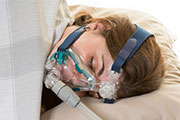
FRIDAY, Sept. 26, 2014 (HealthDay News) — Screening and treating patients for obstructive sleep apnea before they have surgery may reduce their risk of cardiovascular complications by more than half, a new study suggests.
Obstructive sleep apnea is a condition in which the airway relaxes and narrows during sleep, resulting in breathing problems and interrupted sleep, according to background information from the research.
The study included more than 4,200 patients who were diagnosed with sleep apnea either before or after they had surgery, and a group of patients without sleep apnea. Patients diagnosed with sleep apnea before surgery were prescribed continuous positive airway pressure (CPAP) therapy, which keeps the patient’s airway open by delivering a steady stream of air through a face mask.
Patients with untreated sleep apnea were at increased risk for cardiovascular complications such as cardiac arrest or shock, while those who began CPAP therapy before surgery were less than half as likely to develop such complications, the study found.
The researchers also reported that patients with sleep apnea were twice as likely to have surgery-related respiratory complications as those without sleep apnea, and that the airway pressure therapy did not reduce that risk.
The study appears in the October issue of the journal Anesthesiology.
“OSA [obstructive sleep apnea] is a common disorder that affects millions and is associated with an increased risk of surgical complications, but the condition often goes unrecognized,” study lead author Dr. Thomas Mutter, of the department of anesthesia and perioperative medicine of the University of Manitoba in Canada, said in a journal news release.
One-quarter of surgical patients may have obstructive sleep apnea, but the vast majority of these patients aren’t treated or don’t know they have the disorder, he added.
People who are overweight or have high blood pressure are predisposed to developing sleep apnea, Mutter and his colleagues said.
While the study found an association between untreated sleep apnea and surgical complications, it didn’t establish a direct cause-and-effect relationship.
More information
The U.S. National Heart, Lung, and Blood Institute has more about sleep apnea.
Copyright © 2026 HealthDay. All rights reserved.

